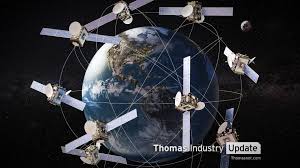
Breaking News
 Palantir kills people? But Who's Really Pushing the Buttons?
Palantir kills people? But Who's Really Pushing the Buttons?
 'Big Short' investor Michael Burry sounds alarm on AI bubble that's 'too big to save
'Big Short' investor Michael Burry sounds alarm on AI bubble that's 'too big to save
 2026-01-21 -- Ernest Hancock interviews Professor James Corbett (Corbett Report) MP3&4
2026-01-21 -- Ernest Hancock interviews Professor James Corbett (Corbett Report) MP3&4
 Joe rogan reacts to the Godfather of Ai Geoffrey Hinton talk of his creation
Joe rogan reacts to the Godfather of Ai Geoffrey Hinton talk of his creation
Top Tech News
 The day of the tactical laser weapon arrives
The day of the tactical laser weapon arrives
 'ELITE': The Palantir App ICE Uses to Find Neighborhoods to Raid
'ELITE': The Palantir App ICE Uses to Find Neighborhoods to Raid
 Solar Just Took a Huge Leap Forward!- CallSun 215 Anti Shade Panel
Solar Just Took a Huge Leap Forward!- CallSun 215 Anti Shade Panel
 XAI Grok 4.20 and OpenAI GPT 5.2 Are Solving Significant Previously Unsolved Math Proofs
XAI Grok 4.20 and OpenAI GPT 5.2 Are Solving Significant Previously Unsolved Math Proofs
 Watch: World's fastest drone hits 408 mph to reclaim speed record
Watch: World's fastest drone hits 408 mph to reclaim speed record
 Ukrainian robot soldier holds off Russian forces by itself in six-week battle
Ukrainian robot soldier holds off Russian forces by itself in six-week battle
 NASA announces strongest evidence yet for ancient life on Mars
NASA announces strongest evidence yet for ancient life on Mars
 Caltech has successfully demonstrated wireless energy transfer...
Caltech has successfully demonstrated wireless energy transfer...
 The TZLA Plasma Files: The Secret Health Sovereignty Tech That Uncle Trump And The CIA Tried To Bury
The TZLA Plasma Files: The Secret Health Sovereignty Tech That Uncle Trump And The CIA Tried To Bury
FCC Authorizes SpaceX to Launch 7,000+ Satellites

Okay, not really. But the jack-of-all-tech superstar entrepreneur did just pocket a huge win, not for building cars or boring tunnels, but for SpaceX.
The Federal Communications Commission (FCC) issued a press release on November 15 confirming that the agency was approving the requests of four companies — one of which is SpaceX — with satellite initiatives.
Specifically, SpaceX was authorized to launch more than 7,000 satellites as part of a collective group that will feature nearly 12,000 — all with the aim of improving internet connectivity.
Through this program, called Starlink, the 7,000+ satellites will orbit Earth between 208 and 215 miles away — just short of where you would find the International Space Station.
The theory goes that it will be easier and cheaper to improve internet access in remote and rural areas by clustering more satellites closer to the earth's surface, rather relying on the larger ones, common in telecommunications applications, that orbit much further out.

 Nano Nuclear Enters The Asian Market
Nano Nuclear Enters The Asian Market


